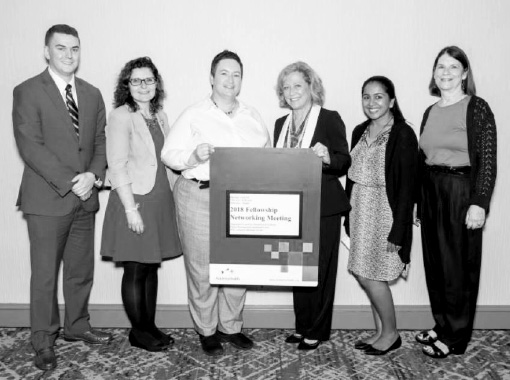Training the Next Generation of Researchers
NCI is the federal government’s principal agency for cancer research and training, and the latter role has been an equal priority for DCCPS since the division’s inception in 1997. DCCPS supports training and career development for cancer researchers working at NCI in Maryland, as well as at institutions around the world. Over the years, DCCPS has trained over 470 fellows at NCI alone, some for several years, allocating $21.3 million to their development. Given that the division is helping to train the next generation of researchers, there is a strong focus on diversity. Of the 2021 class of fellows, for example, 44% considered themselves African American, Hispanic/Latino, Asian, or multiethnic. There is also diversity in educational background of the fellows, with 66% in 2020 holding a PhD or MD, and 34% of the fellows holding a master’s or bachelor’s degree.
In addition to the fellows trained at NCI, the division supports training programs for extramural researchers along the professional trajectory. DCCPS (with the Division of Cancer Prevention in 2019) has hosted the New Grantee Workshop, bringing together new investigators who recently received their first R01 grant. Through interactive sessions and informal activities, grantees learn strategies to successfully manage their grant; have opportunities to network with colleagues and DCCPS scientific staff; and learn about tools, trends, and resources to support their research. DCCPS will host the next New Grantee Workshop in the fall of 2021.
“Attracting, training, and retaining a talented and innovative research workforce for the future is one of NCI’s most important responsibilities.”Norman E. “Ned” Sharpless, MD, NCI Director

DCCPS programs develop and run training that focuses on all parts of the cancer control continuum. The IS program’s TIDIRC, for example, now in its fourth year, provides participants a thorough grounding in conducting D&I research—with a specific focus on cancer—across the continuum. While attendees must be accepted to participate in TIDIRC, all training materials are publicly available online. IS also leads the SPeeding Research-tested INTerventions (SPRINT) program, designed to foster, grow, and nurture an innovation ecosystem for interventionists. SPRINT is run by instructors with extensive startup and teaching experience and is customized specifically for cancer prevention and control interventions. The program provides real-world, hands-on training on how to successfully transform cancer control innovations into market-ready products. The ultimate goal is to create research-tested behavioral interventions that are ready to be put into real-world practice.
DCCPS’s HDRP hosts MLTI, including faculty and guest lecturers who are leading experts in multilevel research, to provide trainees with a grounding in multilevel intervention research, with a specific focus on cancer. HDRP also launched the NCI/AcademyHealth Healthcare Delivery Research Visiting Scholars Program in 2017, in partnership with AcademyHealth. Through a rigorous application process, midlevel researchers are selected to participate in a year-long, funded, part-time opportunity to develop and pursue new research aims that advance both their own career goals and the field of cancer care delivery research more broadly. This program brings knowledgeable experts in healthcare delivery research to NCI, increasing their understanding of NCI and federal resources and data.

2019 New Grantee Workshop
Some of the training supported by DCCPS is more specific, such as the SRP’s training website for cancer registry professionals. BRP’s HINTS also offers educational videos, webinars, and conferences to assist researchers and other data users in maximizing use of the HINTS datasets to inform interventions and cancer communication practice.
Training takes many forms, and numerous DCCPS grants and initiatives include a training component. The TREC initiative, for example, fosters collaboration across multiple disciplines and provides training opportunities for new and established scientists who can carry out integrative research on energetics and energy balance. EGRP also supports a number of cohort studies that provide research opportunities to trainees, and the NCI Cohort Consortium has established an Associate Member Council for early-stage investigators and fellows to help foster active involvement in consortium projects.
Another significant component of our training efforts is support from our NCI partners. For example, NCI’s Center to Reduce Cancer Health Disparities provides diversity supplements to many DCCPS PIs, to support the research training of students, postbaccalaureate and post-Master’s individuals, postdoctoral fellows, and faculty investigators. NCI’s Center for Cancer Training provides support to cancer control researchers through the NCI career development (K) awards program, which includes a broad range of funding mechanisms and provides scientists with support to further develop their cancer research careers, transition to independence, expand their existing research programs, or mentor junior investigators.
Importantly, DCCPS training addresses health drivers and extends beyond our country’s borders. The GEOHealth program supports the development of institutions within LMICs that will serve as regional hubs for environmental and occupational health-related research collaborations, and, like TREC and EGRP-supported cohorts, also includes support for research training activities, among other priorities.
Past DCCPS trainees are now spread throughout the world, interwoven in innumerable disciplines and populations, many leading the way in cancer control. The division will continue to focus on training, from fellows to established researchers, to ensure the long-term growth and stability of the cancer control research workforce and ongoing progress in the field.

NCI/AcademyHealth Healthcare Delivery Research Visiting Scholars Program

